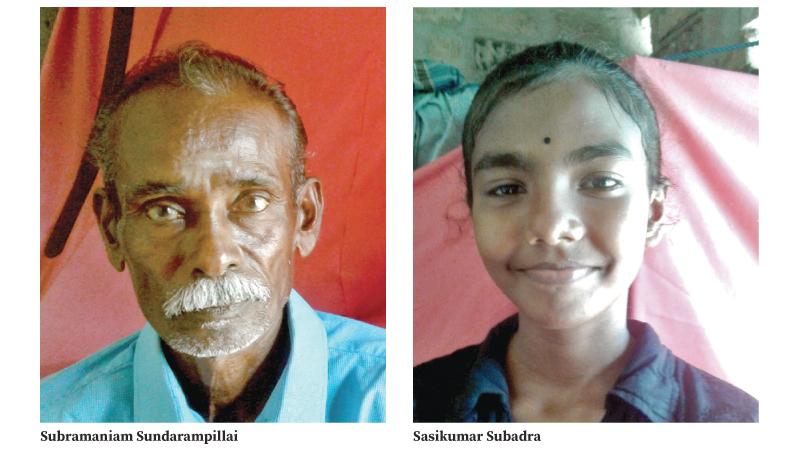
Sasikumar Subadra is 13-years-old. She lives in Killinochchi. She has no memory of three decades of bloodshed, carnage and destruction. She has not been tortured by watching this nation’s citizens divided on geographic and ethnic lines.
Her uncle was an LTTE member who surrendered to the Government after the military defeat of the LTTE. Her uncle is now a model citizen, a community leader who puts himself above others and who does not expect petty gain through it. Sometimes, during school holidays, she assists him at his agricultural farm in the adjoining Mullaitivu district and is even capable of helping him in his entrepreneurial innovations (to create stuff such as egg incubators which, otherwise, have to be bought for exorbitant prices). Adroit at such tasks, one day she could even be an engineer but for the moment, dance is her life.
When I interviewed her, she was preparing for a school dance audition. She nurtures hopes of performing in front of a Colombo audience and making Sinhala friends.
However, her fate could have been different. She could have been preoccupied with explosives, guns and suicide bombings. This is the alternative reality that many of her age were cast into 12 years ago and the trauma of which she will thankfully never have to struggle to recover from.
Bitter memories
Her world is one of undiluted happiness. The joblessness, hunger and difficulty of making ends meet that affect her parents and other adults in her family have not seriously affected her yet.
Her uncle’s father in his late 70s is seated nearby listening to her talking to me in her carefully pronounced English. He cannot understand the words she uses but he is somewhat functional in Sinhala. His mind is rigged with bitter memories of the 30 dark years that ended in 2009, but what he clings to are the years before that. His youthful memories are one of a united and peaceful Sri Lanka.
He recalls his farming days in the 1970s in the Padaviya area; a rural Sinhala village that borders the North which became a target of LTTE terrorism after 1984.
“Tamils of the North and Sinhalese of the then border villages used to cultivate rented agrarian land in that area together.
The Sinhala farmers used to come back after the April New Year holidays with their traditional sweetmeats cooked for the celebrations at home.We attended each other’s weddings and funerals of relatives. I do not know whether they are dead or alive,” Subramaniam Sundarampillai said.
His son had joined the LTTE in his early twenties and after over 15 years, surrendered to the Government in May 2009. After his surrender and completion of the Government’s rehabilitation and social integrated program, his son is a proud father of three who are doing well academically in school and university.
The family focuses on education in the strongest manner possible. Their only hope is education but being educated may not get them a job. What they want most of all is not just to be job takers but job givers.
There are several INGO name-boards but they remain roadside fixtures, having done few projects in the past and possibly some token projects which may exist in funding reports than in actuality.
Community leader and entrepreneur
The following case study explains this context well.
While Subramaniam is mild mannered, his wife, T. Sundarampillai is the opposite. She is a vociferous community leader and entrepreneur. She has run a small grocery store for some years but in the current economic crisis, it remains shut down. She is the women’s leader for several village organisations at Kokkuthuduwai, Mullaitivu where she lives with her husband and daughters but often comes to Killinochchi to visit her children and relatives who live there.
She had several plots of land in Mullaitiviu, but in the 30 years of terrorism and the ensuing contexts she is struggling to prove that she is the owner of those lands because the deeds of these lands have long been lost in the displacement during the battle against terrorism. This is the fate of hundreds of rural Northerners.
These are T. Subramaniam’s words:
“I have eight children; four girls and four boys. They are hardworking but struggling. I do not want to depend on them.
I am trying to raise money to complete digging a well to assist in domestic agriculture. I had initial success with my small grocery store but it was difficult with no banks or any other financial institution helping us.
A few NGOs assisted in some scale financing after May 2009. They are nowhere in the North now. My youngest daughter is 22-years-old. She has scored high marks at the GCE Advanced Level examination. She has no job. She is good in accounts. She is looking for a job.”
However, a commonality is that the people of the North and the South want to be job creators at heart, but have no avenues to do so.
“We do not want free money from the Government or anyone. Give us loans to create jobs. If there are big companies that want to set up businesses here if they recruit us we will work hard for them,” she said.
“If the Government could give us land, that will greatly help us. Most of us have lost the deeds to our lands in the 30 years we spent being displaced. We are efficient at cultivation and agro industries which we can do if we have land.”
“My children like to create things. My son has invented some machines to be used as egg hatchers. He is not an engineer but he thinks like one,” Sundarampillai said.
